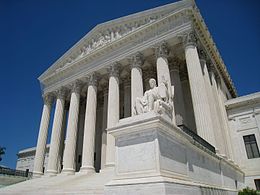Well, the Supreme Court disagreed with me. But, only by a 5-4 vote. The Supreme Court ruled in favor of the President’s travel ban and rejected the appeal of the state of Hawaii. See the opinion in Trump v. Hawaii, No. 17-965 (6/26/2018) here. I previously wrote about that travel ban and its apparent religious bias here and here. The Supreme Court found that the President had broad authority to restrict immigration. And, this was after all the third version, the one the President referred to as a “watered down” version.
Chief Justice Roberts wrote the majority opinion. The President relied on 8 USC Sec. 1182(f), which allows the President broad authority to restrict immigration. Justice Roberts noted that the Proclamation implementing the travel ban is 12 pages long. It provided detailed reasons for the exclusions it sought.
Regarding the allegation that the executive order sought to exclude Muslims, the court noted that the Constitution provides that the government shall take no measure respecting the establishment of a religion. The court noted the many statements by Candidate and President Trump attacking the Muslim faith. In his first week as President, he referred to the first version of the ban as the “Muslim ban.” When the current immigration ban was implemented, he said it was “watered down” and that he wanted something stronger. Justice Roberts then recounted a long history, starting with George Washington, of presidents espousing religious tolerance and freedom. The Justice was clearly calling the current President to a higher standard than to espouse “Muslim bans.”
But, the court would not go so far as to assign bias to the executive order itself. Wearing blinders a bit, the Justice claimed the executive order itself is neutral in regard to the Muslim faith. Of coarse, that conclusion strikes me as naive. The court chose to ignore the President’s own stated bias in effecting this travel ban.
Justice Kennedy issued a concurring opinion, simply to remind the Prudent that he, like all federal officials, took an oath to defend and support the Constitution. Without naming Pres. Trump by name, he was clearly warning the President that he must adhere to the principle of the Constitution even in regard to travel restrictions.
Four justices dissented. This was a close vote. But, the vote to watch belongs to Justice Kennedy. He is the swing vote. He supported the President’s executive order, this time. But, he sent a warning to the executive branch. I am doubtful the President will notice. But, his lawyers will.
